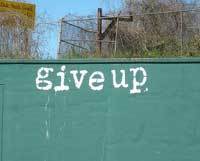The Case Against Hope

Read an interesting column in the Guardian the other day which argued against hope in certain circumstances. The author, Oliver Burkeman, argued that what is often called hope is really deception–hoping for things which are virtually impossible. For example hoping that one wins the lottery or that the victims of an accident have survived when their deaths are near certainties. In contrast letting go of hope often sets us free. To support his claim he refers to “recent research … suggesting that hope makes people feel worse.” For instance: the unemployed who hope to find work are less happy than those who accept they won’t work again; those in the state of hoping for a miraculous cure for a terminal disease are less happy than those who accept the hopelessness of the situation; and many become more active in working for change when they stop hoping for others to do it. Perhaps there is something about giving up hope and accepting reality that is comforting.
Reflections – While I stress the importance of hope in my own thinking–we should generally hope for the best, hope that life has meaning, hope that justice prevails, etc.–the author is clearly on to something. False hopes are futile, leading to inevitable disappointment. Hope against the evidence is false hope, divorced from reality. If I hope to win the lottery, become a famous author or the world’s greatest tennis player my expectations are bound to be dashed. Much better to hope to enjoy my work and make enough money to support my family, and to enjoy writing and tennis and do them as well as I can. It is important to want or wish for good outcomes, but not when such wanting or wishing denies reality.
When confronted by the reality of the concentrations camps in World War II, Victor Frankly did not hope to dig his way out of his prison. That was not possible and such hopes would soon have been dashed, leading to inevitable depression at the hopelessness of his situation. Instead he controlled his own mind and (probably) vaguely hoped for something realistic–like that the war would someday end and he might be freed. That is the difference between false and realistic hope. The former is delusional, the latter worthwhile. Sometimes only fools keep believing; sometimes you should stop believing.



